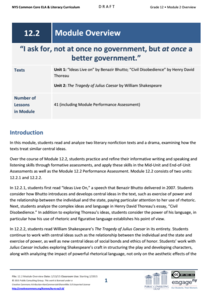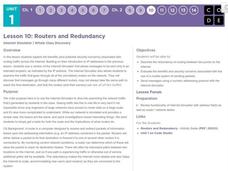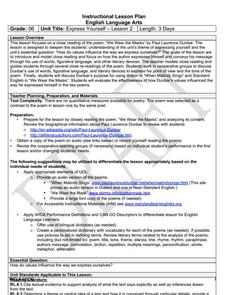EngageNY
Connecting Ideas in Primary and Secondary Sources: What Led to the Attack on Pearl Harbor?
Let's make some sense of those thoughts! Scholars continue thinking about the different perspectives on Pearl Harbor. They analyze quotes from War in the Pacific, Day of Infamy, and Fourteen-Part Message. Readers tape each quote to chart...
EngageNY
Studying Conflicting Information: Varying Perspectives on the Pearl Harbor Attack, Part 2
Scholars take another look at Japan's Fourteen-Part Message. They then take turns adding ideas to sentence starters to create ideas about the different perspectives of government. To finish, groups mix and mingle to share their sentences...
EngageNY
Grade 12 ELA Module 2
The second module in a series for high school seniors focuses on tracking the central idea of a text across genres and from multiple author and character perspectives. Twelfth graders read a speech by Benazir Bhutto entitled "Ideas Live...
National Gallery of Canada
Being a Photojournalist
Tell a story with images. Learners view several photojournalistic photos before agreeing on a message to convey with their own photo stories. In small groups, they take and select photos to include in their final project.
Code.org
Routers and Redundancy
How are messages to the right recipient? Introduce the concept of routing Internet traffic by drawing a comparison to sending a letter. Groups use the Internet Simulator program to send messages to others using the same router...
EngageNY
End of Unit 2 Assessment: Final Literary Analysis
Get ready to review and revise! Scholars peer edit each other's literary analysis essay drafts. Next, using peer and teacher feedback, pupils compose their final drafts.
National History Day
Propaganda Posters of World War I: Analyzing the Methods Behind the Images
The power of a picture. During the events surrounding World War I, propaganda posters were widely distributed in American society to sway the emotions of its citizens. By analyzing World War I propaganda posters in the first installment...
Media Smarts
Bias in News Sources
As young consumers of media, it is important for high schoolers to explore concepts of bias and prejudice, and how they may be present in media. After discussing ideological messages that media can contain, individuals complete a warm-up...
Nuffield Foundation
Investigating How We See Colour
Can you eyes be fooled into seeing colors that aren't actually there? Budding scientists view a presentation that addresses this topic. They explore how their eyes interpret color through the retinas and messages sent to the brain. They...
Curated OER
Bias and Crime in Media
Critical thinking and social justice are central themes for this resource on bias and crime in media. The class views and discusses an incisive PSA that highlights assumptions based on race. Small groups read newspaper opinion pieces...
Speak Truth to Power
Dalai Lama: Free Expression and Religion
How is religious freedom connected to the conflict between China and Tibet? After reading an online passage of background information, your learners will divide into groups and both read and view an interview with the Dalai Lama. They...
National WWII Museum
Dr. Seuss and WWII
What famous children's author and illustrator created World War II political cartoons featuring such subjects as fascism, the war effort, discrimination, and the dangers of isolationism? The who in this story is Dr. Seuss, and what...
Media Education Lab
Propaganda in Context
"Board Game Helps Fight Real World Ebola," a video produced by Voice of America, provides the text for a guided instructional activity that asks viewers to analyze the propaganda techniques used in the video. Groups then select a example...
Common Sense Media
Cyberbullying: Crossing the Line
Teach pupils to identify different forms of cyberbullying, including harassment, deception, “flaming,” and threats to safety, as well as how to handle a situation in which cyberbullying might be involved.
Federal Trade Commission
Ad Awareness
Movie theaters, shopping malls, television, the Internet ... no matter where people go, they are inundated with advertisements. Scholars discuss the topic of ad awareness using the first of four Admongo lessons about advertising. Pupils...
Curated OER
6th Grade: Express Yourself, Lesson 2: Close Read
The second lesson of a pair about Paul Laurence Dunbar, this plan focuses in particular on his poem, "We Wear the Masks." After a short historical introduction, class members conduct a series or readings, marking up the text and...
San Diego Unified School District
On-Demand Persuasive Writing Samples
Young writers complete a timed persuasive writing assignment in which they argue for a club they would like to see established at school, and are then provided with real student samples of responses.
Advocates for Human Rights
A Global Perspective on Immigration
To gain a global perspective on immigration, groups investigate and create a map of the migration patterns in Africa, Asia, Europe, Latin America, and the Middle East. Class members then examine the background, immigration history, and...
National History Day
Why Did the United States Enter World War I in 1917?
World War I was the first major conflict on a global scale. Using primary documents, learners determine why the United States chose to enter World War I when it did. After analytical writing and group research, the causes of America's...
Walters Art Museum
The Symbolism of Allegorical Art
Introduce learners to allegorical art with four bronze sculptures by Francesco Bertos. After modeling how to recognize bias and allegory in Bertos' Africa, class groups examine the other three sculptures in the series before creating...
Calvin Crest Outdoor School
Survival
Equip young campers with important survival knowledge with a set of engaging lessons. Teammates work together to complete three outdoor activities, which include building a shelter, starting a campfire, and finding directions in the...
National WWII Museum
“My Dear Little Boys…” Interpreting a letter home from the war
Letters have long been prized by historians as primary sources for what they reveal not only about events but also about the emotional responses of the writers to these events. "My Dear Little Boys," a letter written by Leonard Isacks on...





















